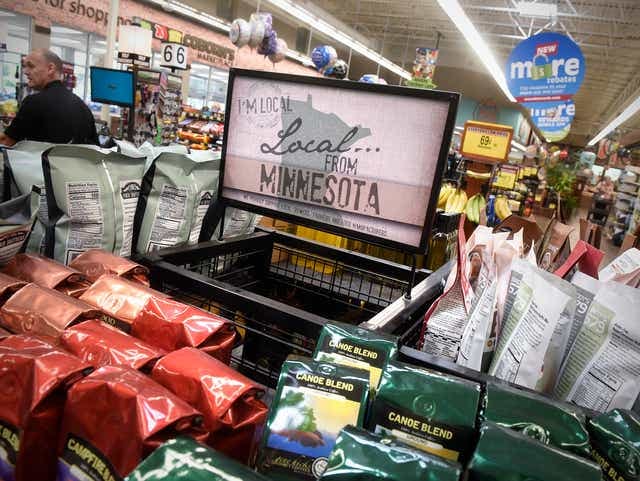British retailer Marks & Spencer has just completed a two-month Sparking Change national challenge, encouraging its 14 million Sparks loyalty customers to embrace a lower-carbon diet for the sake of the planet.
During January and February, the retailer provided recipes, tips, and cooking demos, intended to encourage:
- Consumption of more plant-based meals
- Reduction of food waste
- Cooking from scratch
- Living sustainably beyond the kitchen

The information should resonate, since the recent M&S Family Matters Report revealed that two-thirds of families in the U.K. are increasingly concerned about the environment.
Before launching the campaign, M&S partnered with environmental charity Hubbub to create a nine-week behavior change pilot involving almost 100 families. The second campaign built on learnings from that.
“Information was shared in an accessible, playful language and delivered in bite-sized chunks. The group responded brilliantly to simple, jargon-free information and tips,” says Mark Breen, senior creative partner, Hubbub.
The team also worked hard to highlight positives, including savings and introducing new foods; and it created a community with a Facebook group which, “creates a sense of being part of something bigger,” he points out.
The two areas where consumers really excelled, says Breen, were in increasing consumption of plant-based foods and decreasing food waste. “Lots of people making simple changes is much better than just a few people making wholesale changes,” he says.
British retailers set goals
Marks & Spencer isn’t alone in the U.K. In 2020, Tesco ran a No Time For Waste challenge (also with Hubbub) and last fall that retailer promised to achieve net-zero carbon emissions by 2050 across its operations, together with those generated by the products it sells and its supply chains.
And retailer Co-Op announced last year that it would be carbon-neutral by 2040, which includes being the first British supermarket to offer carbon-neutral private label products. The retailer will also price match its plant-based private label products to equivalent meat products; it will convert its home delivery fleet to electric; end the use of fossil fuel heating; lower farm agricultural emissions; cut packaging; and reduce impacts from soy in animal feed.
Kiwi stores set targets
Meanwhile, in New Zealand, Countdown supermarket announced three years ago that it would aim to drop carbon emissions by 60% by 2030. The retailer is focusing on using electric or hybrid vehicles, efficiencies in moving food around the country; moving to natural gasses for refrigeration and more solar power; cutting private label packaging, and decreasing food waste.
Stateside stores going local
Similar goals are brewing in the U.S.
Coborn’s is finding more customers are asking where their food comes from and are putting a greater emphasis on purchasing local foods. “Our company has put more focus on highlighting local products throughout our store, but especially those grown on local farms,” says Emily Parent, MFCS, RD, LD, FAND, health and wellness director for the St. Cloud-Minn.-based chain.
The stores make it easy for consumers to buy more local foods by featuring the farms and farmers via store signage through their ‘local’ shelf tag attribute; and through education.
Parent has also seen more interest from Coborn’s shoppers in plant-based foods and meals, though believes that’s more due to their health benefits than environmental impacts. However, she says, to make consumers more aware, “we have started to include more messaging on sustainability.”
U.S. stores look at the big picture
Ahold, whose banners include Stop & Shop and Giant Food, announced in November that it would reach net-zero carbon emissions by 2040. Meijer announced this year that it planned to reduce carbon emissions by 50% by 2025. The Grand Rapids, Michigan -based retailer will start by focusing on fleet efficiency and piloting new technologies, such as energy-saving geothermal projects for refrigeration.
Other stores are encouraging consumers to help in their efforts. Pyramid Foods, which has 10 banners including Price Cutter and Ruby’s Markets, is helping local farmers by letting them advertise for free in its circulars and Ruby’s is running Facebook taste tests with local vendors. Festival Foods is promoting local farmers with videos and farm tours, and Rouse’s Markets chain is growing herbs and veggies on the rooftop in its New Orleans store, to sell to customers.
“Smart companies have realized not only the moral side but also the business side: That this is something they have to do. We are increasingly seeing supermarkets start to take responsibility,” says Avipsa Mahapatra, climate campaign lead, Environmental Investigation Agency, a non-profit which operates the website www.climatefriendlysupermarkets.org.
“Many grocery stores are taking [lowering their carbon footprint] into consideration as part of remodels,” says Carlos Castelán, managing director of The Navio Group, a Minneapolis, Minn.-based retail and consumer goods consulting firm. “In particular, energy-efficient buildings, coolers, etc., are top of mind because they are good for the environment while reducing long-term operational costs.”



